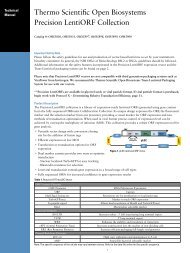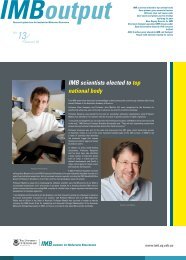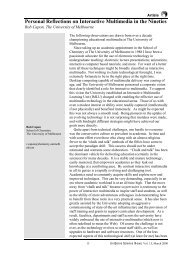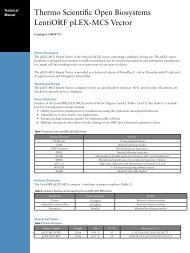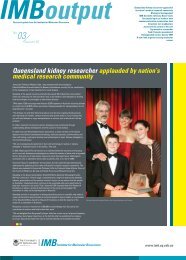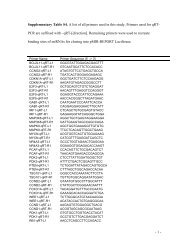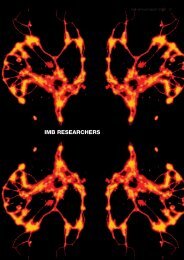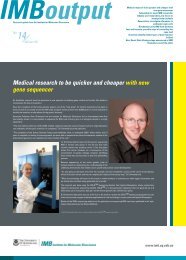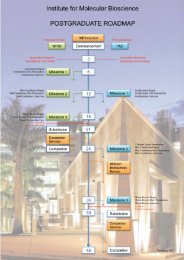2010 Annual Report - Institute for Molecular Bioscience - University ...
2010 Annual Report - Institute for Molecular Bioscience - University ...
2010 Annual Report - Institute for Molecular Bioscience - University ...
You also want an ePaper? Increase the reach of your titles
YUMPU automatically turns print PDFs into web optimized ePapers that Google loves.
imb annual report <strong>2010</strong><br />
14<br />
IMB FELLOWSHIP FOR PLANT<br />
BIOLOGIST<br />
Research into using plant seeds to<br />
produce otherwise costly drugs has<br />
snagged Dr Joshua Mylne the inaugural<br />
IMB Fellowship, the Professor John S.<br />
Mattick Fellowship.<br />
The IMB Fellows program was<br />
established by the <strong>Institute</strong> in <strong>2010</strong> and<br />
aims to provide support <strong>for</strong> outstanding<br />
senior postdoctoral scientists to<br />
transition to independent researchers.<br />
The fellowship was named after<br />
Professor John Mattick, co-founder and<br />
inaugural Director of the IMB.<br />
Dr Mylne will use the $90,000 fellowship<br />
to help support his research into the way<br />
sunflower seeds manufacture proteins,<br />
a process he believes could be modified<br />
to produce protein drugs.<br />
Professor John Mattick presents Dr Joshua Mylne with his John S. Mattick Fellowship<br />
certificate.<br />
awards<br />
WORLD’S LARGEST SCIENTIFIC<br />
SOCIETY AWARDS IMB<br />
RESEARCHER<br />
An IMB researcher developing a drug<br />
<strong>for</strong> pain from cone snail venom has<br />
been awarded a prestigious prize from<br />
the world’s largest scientific society.<br />
Professor David Craik won the Ralph F.<br />
Hirschmann Award in Peptide Chemistry<br />
from the American Chemical Society.<br />
Peptides are small proteins that play<br />
a number of important roles in the<br />
body. Professor Craik was recognised<br />
<strong>for</strong> his work with circular peptides,<br />
known as cyclotides. He described the<br />
first cyclotide and has been a major<br />
contributor to the field ever since.<br />
One of his most significant achievements<br />
is the engineering of a new circular<br />
peptide to treat pain. Normal peptides<br />
can relieve pain but are unstable, while<br />
the circular version created by Professor<br />
Craik has proven effective at treating<br />
pain in early trials.<br />
FIVE IMB GRADUATES’ THESES IN<br />
TOP TEN PERCENT<br />
Five IMB students made the Dean’s<br />
Awards List <strong>for</strong> Outstanding Research<br />
Higher Degree Theses: Dr Ming<br />
Chang (Sweet group), Dr Conan Wang<br />
(Craik group), Dr Markus Muttenthaler<br />
(Alewood group), Dr Ryan Taft and Dr<br />
Tim Mercer (Mattick group).<br />
IMB RESEARCHER ONE OF<br />
HIGHEST-RANKED IN NATION<br />
Professor Rob Parton was recognised<br />
as being one of the best and brightest<br />
in the country at the NHMRC awards,<br />
held in March. Professor Parton received<br />
the Achievement Award <strong>for</strong> having the<br />
Highest-Ranked Project Grant.<br />
These grants are awarded by the council<br />
to fund specific projects, and each<br />
application is individually ranked. Out of<br />
the 683 grants awarded across Australia<br />
in 2009, Professor Parton’s application<br />
was ranked the highest.<br />
His project will investigate ways of treating<br />
prostate cancer through suppressing the<br />
secretion of a protein called caveolin. This<br />
protein is normally embedded in the cell<br />
surface but in aggressive <strong>for</strong>ms of prostate<br />
cancer it is secreted from cancerous cells<br />
and promotes the progression of the<br />
disease.<br />
IMB RESEARCHERS TOP STATE<br />
WITH PAIN AND IMMUNE<br />
RESEARCH<br />
IMB researchers took out half of the<br />
awards on offer at the <strong>2010</strong> Queensland<br />
Health and Medical Research Awards.<br />
Dr Richard Clark won Senior Researcher<br />
of the Year <strong>for</strong> his work on developing a<br />
medication <strong>for</strong> chronic pain using cone<br />
snail venom, while Dr Kate Schroder won<br />
Postdoctoral Researcher of the Year <strong>for</strong><br />
completing the first comparison of mice<br />
and human innate immune systems.<br />
TOP HONOURS STUDENTS<br />
AWARDED<br />
The best IMB honours students of the<br />
past two years were recognised with an<br />
awards presentation in late March. The<br />
Amgen Award is given to the overall best<br />
IMB honours student in a particular year,<br />
with the winner being decided based on<br />
grades <strong>for</strong> the honours thesis and the<br />
overall honours mark.<br />
The 2008 winner was Elanor Wainwright,<br />
who completed her thesis in the<br />
Koopman/Wilhelm laboratories. Ms<br />
Wainwright’s project explored the role<br />
of Mir-202, a type of RNA, in gonad<br />
development.<br />
Sheila Barbero and Anne Sawyer shared<br />
the award in 2009. Ms Barbero, from<br />
the Fairlie group, studied a type of<br />
enzyme that has potential therapeutic<br />
benefits if used after a stroke. Ms<br />
Sawyer investigated the purification<br />
and characterisation of a protein<br />
from a species of green algae, which<br />
the Hankamer group are genetically<br />
modifying to produce commercial<br />
quantities of hydrogen and other<br />
biofuels. All three women have gone on<br />
to PhD study within the IMB.<br />
STUDENT PRIZES<br />
For a detailed list of other student prizes<br />
in <strong>2010</strong>, please turn to page 69.




